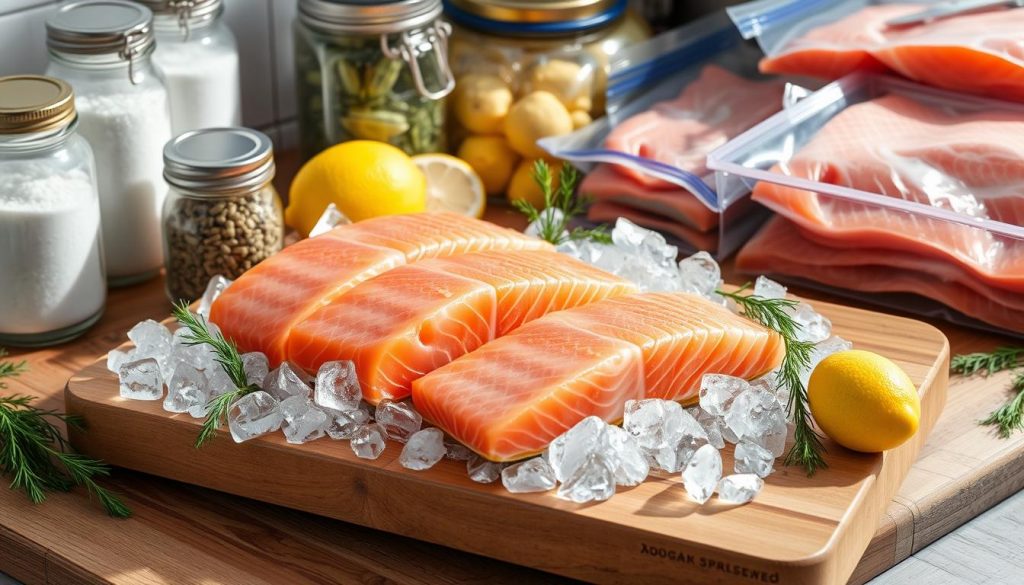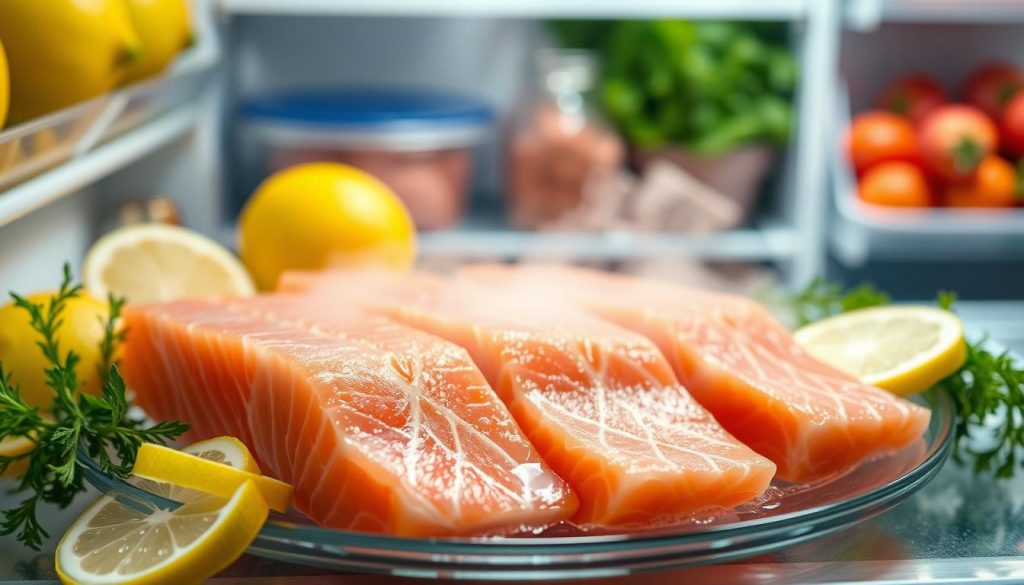Salmon offers a rich taste and numerous health benefits. Proper storage is crucial for maintaining its freshness. This guide explores how to keep salmon fresh through correct refrigeration.
Raw salmon requires careful storage. The USDA recommends eating it within 1 to 2 days when refrigerated. This ensures you enjoy salmon at its best and avoid food safety risks.
Correct storage is vital for preserving salmon quality. By following the right steps, you can maintain its freshness. Let’s discover how to keep your salmon in top condition in your fridge.
Key Takeaways
- Raw salmon lasts up to 2 days in the fridge
- Cooked salmon stays fresh for 3-4 days when refrigerated
- Proper storage is crucial for food safety and quality
- The fridge temperature should be set at 40°F or below
- Always check for signs of spoilage before eating
Understanding Salmon Storage Basics
Salmon preservation is vital for food safety and quality. Let’s explore key aspects of storing salmon to keep it fresh. Proper storage prevents bacterial growth and maintains nutritional value.
Why Proper Storage Matters
Fresh salmon lasts up to 2 days in the fridge. Cooked salmon stays good for 3 to 4 days. Use thawed frozen salmon within 1 to 2 days.
Temperature Requirements for Safe Storage
Set your fridge temperature to 40°F (4.4°C) or below. This slows down bacterial growth and keeps salmon fresh longer.
The Impact of Air Exposure on Freshness
Limiting air exposure is key to preserving salmon. Vacuum-sealed salmon can last up to 8 months in the freezer. Regular frozen salmon lasts about 3 months.
When storing in the fridge, use airtight containers. You can also wrap salmon tightly to maintain freshness.
| Storage Method | Refrigerator | Freezer |
|---|---|---|
| Fresh Salmon | 2 days | 3 months |
| Cooked Salmon | 3-4 days | 2-3 months |
| Vacuum-Sealed Salmon | 2 days | 8 months |
Follow these storage basics to keep salmon fresh and safe. This will maximize its shelf life and flavor. Enjoy your delicious, well-preserved salmon!
How Long Does Raw Salmon Last in the Fridge
Raw salmon’s shelf life in the fridge is crucial for quality and safety. We’ll explore how long you can keep this popular fish fresh. Understanding proper storage helps maintain its delicious flavor.
USDA guidelines state that raw salmon lasts up to two days in the fridge after thawing. This timeline ensures optimal freshness and flavor. Storage time may vary based on how the salmon was handled before refrigeration.
Follow these tips for the best raw fish storage:
- Store salmon in the coldest part of your fridge, typically the back or bottom drawer
- Wrap the fish tightly in plastic wrap or place it in a sealed container
- Keep the refrigerator temperature at or below 40°F (4°C)
Don’t keep vacuum-sealed raw salmon in the fridge for more than two days. Once opened, eat within three days of thawing. For longer storage, freeze your salmon for up to three months.
“Fresh is best when it comes to salmon. Always prioritize proper storage to maintain its delicate flavor and texture.”
These guidelines help maximize salmon shelf life. Trust your senses when checking for freshness. If you notice off odors, discoloration, or slimy texture, discard the fish immediately.
Optimal Storage Conditions for Fresh Salmon
Storing salmon correctly is crucial for freshness and safety. Let’s explore top food storage methods and refrigeration tips for your salmon.
Best Storage Containers and Wrapping Methods
Wrap salmon tightly in plastic wrap, then add a layer of aluminum foil. This double-layer keeps air and moisture out. For extra protection, use airtight containers or resealable bags.

Importance of Refrigerator Temperature Control
Keep your fridge below 40°F (4.4°C) to slow bacterial growth. This extends the shelf life of your salmon. Use a thermometer to check the temperature often.
Preventing Cross-Contamination
Store salmon on the bottom shelf of your refrigerator. This prevents drips from contaminating other foods. Place it in a shallow dish to catch any leaks.
| Storage Method | Duration | Temperature |
|---|---|---|
| Refrigeration (Raw) | 1-2 days | 32°F – 38°F (0°C – 3°C) |
| Freezing | 2-3 months | 0°F (-18°C) or below |
| Vacuum Sealed (Refrigerated) | 1-3 weeks | 32°F – 38°F (0°C – 3°C) |
These storage tips will keep your salmon fresh and tasty. Good storage practices preserve both flavor and quality. Enjoy your perfectly stored salmon!
Storage Duration for Different Types of Salmon
Fresh salmon tastes great and is safe to eat. Let’s explore how long you can store various salmon types. This info will help you enjoy your seafood better.
Raw salmon lasts 1-2 days in the fridge. For longer storage, freeze it. Frozen salmon stays good for up to three months. Vacuum-sealed salmon can last 6-9 months in the freezer.
Cooked salmon is best eaten within 24 hours. You can keep it in the fridge for 3-4 days. If not eating soon, freeze it for 2-3 months.
Smoked salmon is tasty and easy to use. Unopened, it lasts up to two weeks in the fridge. Once opened, eat it within 5-7 days.
Canned salmon can stay in your pantry for years. After opening, refrigerate and eat within 2-3 days.
| Salmon Type | Refrigerator | Freezer |
|---|---|---|
| Raw | 1-2 days | 3-4 months |
| Cooked | 3-4 days | 2-3 months |
| Smoked (unopened) | 2 weeks | 3-4 months |
| Canned (opened) | 2-3 days | Not recommended |
Store salmon right to keep it fresh and safe. Keep it at 32-38°F in the coldest part of your fridge. This will help it last longer.
Signs of Spoiled Salmon
Knowing how to spot bad salmon is key for safe eating. We’ll look at ways to tell if your salmon is fresh and okay to eat.
Visual Indicators
Fresh salmon should look bright and lively. Look for pink, orange, or red colors with light marbling. The skin should shine like metal.
If you see dull, gray colors or white film, the fish may be old. These are signs that the salmon isn’t fresh anymore.
Smell and Texture Changes
Good salmon smells mildly like the ocean. A strong fishy or ammonia smell means it’s gone bad. The flesh should be firm and spring back when touched.
If it feels soft, sticky, or slimy, throw it away. These are clear signs of spoiled salmon.
Color Variations to Watch For
Salmon’s color can change as it ages. Small changes are normal, but big ones are worrying. Look out for these color shifts:
- Dark brown or black spots
- Yellowish discoloration
- Pale, grayish tones
| Characteristic | Fresh Salmon | Spoiled Salmon |
|---|---|---|
| Color | Bright pink/orange/red | Dull, grayish |
| Smell | Mild ocean scent | Strong fishy/ammonia odor |
| Texture | Firm, bounces back | Mushy, slimy |
| Appearance | Shiny skin, clear eyes | White residue, sunken eyes |
If you’re not sure, it’s best to play it safe. Eating bad salmon can make you sick. You might feel sick, throw up, or have diarrhea.
Always put safety first when handling and eating fish. It’s better to be cautious than to risk getting sick.
Proper Handling Techniques for Raw Salmon
Safe handling of raw salmon is crucial for kitchen hygiene. Let’s explore the key steps for preparing salmon safely at home.
Start by washing your hands with soap and warm water. This prevents bacteria spread. Keep your work area clean and use separate cutting boards for fish and other ingredients.
Use clean utensils when preparing salmon. Sanitize all surfaces that touch the raw fish. Hot, soapy water works well for cleaning. You can also use a dishwasher cycle.
- Use clean utensils and cutting boards
- Wash hands before and after handling salmon
- Keep raw salmon separate from other foods
- Clean and sanitize all surfaces after use
Store raw salmon in the fridge and use within 1-2 days. For longer storage, consider freezing to keep it fresh.
| Salmon Type | Refrigerator Storage | Freezer Storage |
|---|---|---|
| Raw | 1-2 days | Up to 3 months |
| Cooked | 3-4 days | Up to 1 month |
| Smoked | 5-7 days | 2-3 months |
Follow these tips to keep your salmon safe and tasty. Enjoy fresh salmon dishes in your home with confidence.
Extending Salmon’s Shelf Life
Fresh salmon is a prized catch. Let’s dive into some top-notch storage techniques. These methods will keep your fish tasty for longer.
Vacuum Sealing Benefits
Vacuum sealing is a game-changer for salmon storage. It can keep your fish fresh for up to 8 months in the freezer. This method removes air, slowing spoilage and preserving flavor.
It’s perfect for bulk buyers or long-term storage fans. Vacuum sealing ensures your salmon stays delicious for months.
Proper Packaging Methods
Start by patting the salmon dry with paper towels. This step removes excess moisture that can cause bacterial growth. Next, wrap the fish tightly in plastic wrap or aluminum foil.
For extra protection, place the wrapped salmon in a resealable plastic bag. This layered approach keeps your fish fresh and tasty.
Temperature Management Tips
The right temperature is key for salmon preservation. Keep your fridge between 32°F and 38°F. Store salmon in the coldest part, usually the back or bottom drawer.
For freezer storage, set the temperature to 0°F. These tips will help your salmon last longer and taste better.
| Storage Method | Temperature | Shelf Life |
|---|---|---|
| Refrigeration | 32°F – 38°F | 1-2 days |
| Freezer (Regular) | 0°F | 3-4 months |
| Freezer (Vacuum Sealed) | 0°F | Up to 8 months |
Freezing Raw Salmon for Long-Term Storage
Freezing is a great way to store raw salmon for a long time. You can keep frozen salmon fresh for up to three months. To get the best results, wrap the salmon tightly in plastic wrap or foil.
Then, place it in a freezer-safe bag or container. Label the package with the date you froze it. For even better preservation, use a vacuum sealer to prevent freezer burn.
Frozen salmon can be stored indefinitely. However, its quality may start to decline after three months. It’s best to use it within that time frame.
Here’s a helpful guide for freezing and storing different types of salmon:
| Type of Salmon | Freezer Storage Time | Best Quality Period |
|---|---|---|
| Raw Salmon | Up to 6 months | 2-3 months |
| Smoked Salmon (opened) | 1 month | 1 month |
| Canned Salmon | 3 months | 3 months |
| Cooked Salmon | 1 month | 1 month |
Thawing frozen salmon properly is just as important as freezing it correctly. Plan ahead and allow about 12 hours for thawing in the fridge. For salmon over a pound, give it 24 hours to thaw fully before cooking.
Thawing Methods and Safety Guidelines
Safe thawing is vital for preparing salmon. Let’s explore three effective techniques to defrost your fish safely. These methods maintain quality while ensuring food safety.
Refrigerator Thawing
The safest way to thaw salmon is in the refrigerator. Put the frozen fish in a covered container overnight. This method takes 12 to 24 hours but ensures even thawing.

Cold Water Thawing
For faster results, try the cold water method. Submerge the sealed salmon package in cold water. Change the water every 30 minutes. This technique thaws fish quickly while keeping it safe.
Microwave Thawing Precautions
Microwave thawing is fastest but needs caution. Use the defrost setting and check your salmon often. This prevents partial cooking. Cook microwave-thawed fish right away to stop bacteria growth.
- Never thaw salmon at room temperature
- Cook thawed salmon within 1-2 days
- Avoid refreezing fully thawed raw salmon
Safe thawing keeps salmon fresh for tasty meals. Always put food safety first in your kitchen. These methods help you prepare salmon correctly and safely.
Storage Tips for Cooked Salmon
Proper storage keeps leftover salmon delicious and safe to eat. Cooked salmon stays fresh in the fridge for up to four days. It’s perfect for meal prep and busy families.
For short-term storage, cool salmon completely before placing it in an airtight container. This step ensures food safety and preserves quality. Refrigerate if you plan to eat it within two days.
Freezing is great for long-term storage of cooked salmon. It can maintain quality for up to six months when frozen properly. When reheating, make sure the internal temperature reaches 165°F (74°C).
These simple tips help you enjoy salmon dishes longer. They also reduce food waste in your kitchen.




